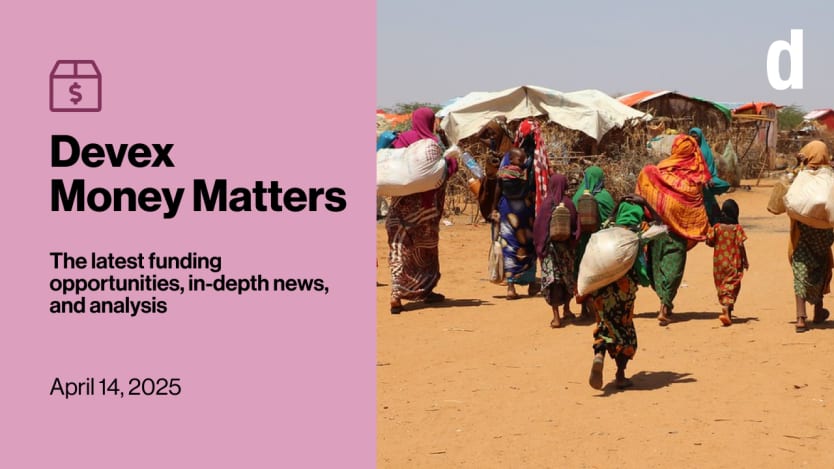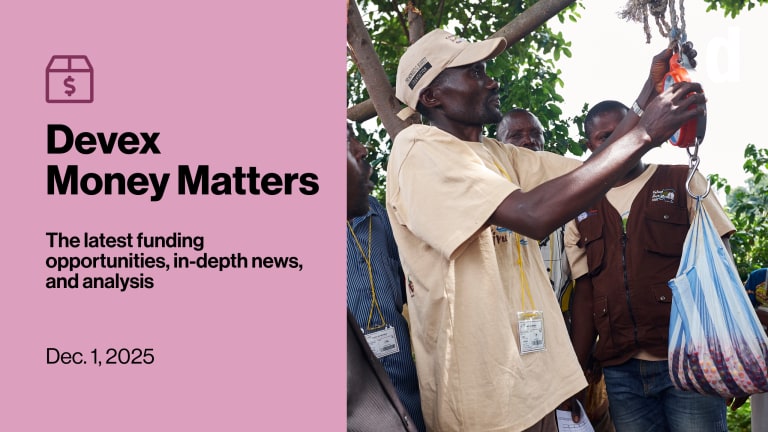
It’s been yet another turbulent week for U.S. foreign assistance, with new cuts and plenty of speculation about the future. While Devex has continued to track the rapidly shifting U.S. aid environment, we’ve also been busy this week looking at other sources of funds — particularly the World Bank, which will shortly hold its Spring Meetings, and the philanthropic sector, which has begun to speak out about its future plans.
+ Are there topics you want to read more about in Money Matters? We want your feedback.
Counting the cost of the cuts
This is a preview of Devex Money Matters
Sign up to this weekly newsletter and get the latest in development funding in your inbox every Monday.
When the global north cuts aid, the ax does not fall equally on all countries, for the simple reason that some depend more on aid than others. In a fresh analysis published this week, we’ve mapped out the countries that depend most on aid, and which do not have strong governments of their own to replace any lost flows.
One country that stands out is Somalia, which has the highest ratio of aid to gross national income among the countries analyzed, relying on aid for 17.6% of its GNI.
Read: Which countries are the most at risk for aid cuts? (Pro)
Interested in more business and funding coverage? Explore our funding overview page. If you're a Pro member, you can set up news alerts for funding articles. Not yet a Pro member? Try it today with a 15-day free trial.
Funding activity
We publish tenders, grants, and other funding announcements on our Funding Platform. Here are some of the ones that have been viewed the most in the past 10 days.
The Asian Development Bank signed a $20 million investment to support growth capital for businesses that drive sustainable development in Asia and the Pacific.
The European Bank for Reconstruction and Development is providing a €2.9 million ($3 million) package to support micro, small, and medium-sized enterprises, or MSMEs, and women-led businesses in the occupied Palestinian territory.
Belgian development agency Enabel is seeking proposals to improve citizen participation and accountability and strengthen anti-corruption efforts in local government units in Uganda.
German development bank KfW invites applications to provide sustainable and equitable access to drinking water and basic sanitation facilities in Kenya.
The United Nations is seeking a team of experts to promote biodiversity conservation by developing a sustainable entrance fee structure for protected areas and forest enterprises in Kyrgyzstan.
The World Bank has announced a $12 million loan to improve agricultural productivity in Sierra Leone.
+ Try out Devex Pro Funding today with a free five-day trial, and explore funding opportunities from over 850 sources in addition to our analysis and news content.
World Bank wins
The World Bank awarded more than 26,000 contracts, worth nearly $15 billion, in the last financial year. Of that, 9,510 contracts, worth almost $1.7 billion, were for consultant services. But which countries won them? And where was the work done? What sectors did the World Bank commission the work for? And which companies won the most business?
We’ve got all that information for you, and more.
Read: Who’s winning the World Bank’s consulting contracts? (Pro)
+ As the World Bank-IMF Spring Meetings start next week, the big question is what will the Trump administration do when it comes to these multilateral institutions. To explore this, join us this Wednesday, April 16, for an exclusive conversation with Congressman French Hill, the Republican chair of the House Financial Services Committee. Save your spot now.
A ‘death sentence for millions’
The United States made another surprise round of aid cuts last week, including 42 programs that had previously been spared. The surprise cuts hit many of the world’s most vulnerable, although the Trump administration later announced that some of the cuts had been a mistake. Meanwhile, USAID staff are being repatriated, and, at the same time, fired.
The U.S. administration has also taken steps to continue to shutter two smaller foundations — the U.S. African Development Foundation and the Inter-American Foundation, despite judicial steps to block the process.
At the same time, USAID’s merger with the State Department continues, albeit with many questions, as a Devex Pro event heard last week.
Not the least of those questions is the role of Secretary of State Marco Rubio, previously a supporter of aid, but now the senior politician presiding over the merger.
Read: Marco Rubio — what part is he actually playing in USAID's dismantling?
Watch: USAID's merger with the State Department — the pros, cons, and questions (Pro)
ICYMI: Trump administration admits lifesaving aid was accidentally cut
Further reading: USAID foreign officers to be repatriated, local staff fired by Aug. 15
Die Axt ist gefallen
Germany has historically been one of the world’s most generous donors, both relative to its income and in absolute terms. But recently, its commitment to aid has seemed to be wavering.
One of the two main partners in its new ruling coalition, the center-left Social Democratic Party, or SPD, had wanted to maintain aid at 0.7% of GNI, while the center-right Christian Democratic Union, or CDU, which won the larger share of the vote, was in favor of scrapping the target.
It appears that CDU has won that particular battle in the power-sharing negotiations, my colleague Jesse Chase-Lubitz writes, although the main aid agency, BMZ, has avoided a proposed merger into the foreign ministry.
Read: Germany's coalition contract includes new cuts to aid budget (Pro)
Will philanthropy step up?
In the absence of funding from country-level donors, where else might individuals go to seek more funds?
It’s worth putting in context that the reduction we will see in coming years follows an unprecedented expansion — driven by the COVID-19 pandemic and the war in Ukraine — so while the collapse feels dramatic, it may only return us to the levels of the last decade.
Over the last few days, we’ve heard from major philanthropies. The leader of the MacArthur Foundation spoke about increasing giving, while the leader of Open Society Foundations has talked about a fresh strategy.
My colleague Raquel Alcega and I held a session last week to launch her new report, which looks at ways of diversifying funding in this environment. We talked about several of the key issues — many of which were also top of mind at the Skoll World Forum, which we also covered last week.
Watch: What’s next for global development funding in 2025 (Pro)
Download: 4 ways to diversify your funding strategy
Read: OSF’s new strategy bets on longer-term, more flexible funding (Pro)
And ICYMI: 6 things we learned at the Skoll World Forum 2025
Sign up to Money Matters for an inside look at the biggest stories in development funding.








